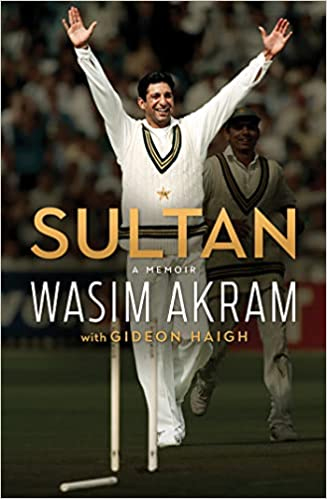|
|
 |
SULTAN: A MEMOIR Wasim Akram with Gideon Haigh
Published by:
Hardie Grant Books
An imprint of Hardie Grant Publishing,
Wurundjeri Country, Building 1,
658 Church Street, Richmond,
Victoria 3121 AND 5th and 6th Floors,
52-54 Southwark Street,
London SE1 1UN.
Contact: hardiegrant.com/au/books
Pages: 296
MRP: £18.99
|
|
|
Gideon Haigh, co-collaborator on Wasim Akram's Sultan: A Memoir, wrote I see comparatively recently about Sir Geoffrey Boycott's Being Geoffrey Boycott (in collaboration with Jon Hott thus: Boycott and Hotten: what a collaboration. Absolutely. If I may, having read Wasim Akram's Sultan, Akram and Haigh too make a pretty decent collaboration. Add Ric Finlay, the chap who compiled the extensive and formidable statistical section and from whose statistical website I have subscribed for longer than I can remember, and readers, in my estimation, have a terrific book about this fantastic Pakistani and Lancastrian cricketer.
It was a book I was keen to read. I have been fortunate to have visited India on forty-one occasions but, sadly, not once to Pakistan. The Wagah Border is the closest. Wasim's book is excellent not just as a firmly-written and concise appraisal of one of Pakistan's top bowlers but it also gives a very fine account of the country: how it, and the cricketing body, functions interspersed naturally with many of Wasim's memories. It is probably the first book which I have read that gives such an understanding of Pakistan as a whole and is helpful in putting the country into context of what we might have heard and gives us a better comprehension.
To me, the book comes over fairly. That said, his views are clear and blunt on certain people. Others, such as Imran Khan, are revered. The book seems to be straightforward and honest although I felt that the tone towards the end was, well, even more frank.
Pakistan has often been on the wrong end of accusations of malpractice down the years yet Wasim candidly gives his account of those episodes. It has not always been an easy ride for him, or others. The reader, though, should come away with a better understanding of how the country and cricket operates. I admit that it was easy to be taken in by the ball allegations back in the 1990s and to think that maybe something sinister was going on. England, in 2005, though, after almost nineteen fallow years without the Ashes, finally broke their hex and one key element mentioned as being part of their success was reverse swing. This is now an established feature of today's game and therefore the Pakistani bowlers of the end of the last century could be seen as fine and founder-member exponents of this art.
Wasim's self-deprecating take on his younger and, at times, later, years may bring a smile. When Sultan: A Memoir was due to be published, much was made of his taking of drugs. In my estimation, it is just one aspect of a story which has included many highs and lows. Topics which have followed Wasim about from ball-tampering to his missing of the India and Pakistan World Cup match at Bangalore in 1996 are addressed.
Far from everything has been sweetness and light for Wasim both on and off the field. I have witnessed what Indian players have to go through and imagined that it would be similar on the other side of the border. Wasim's many examples, and that of the restrictions faced between the two countries are illuminating. It is nice to read of the many Indian cricket friends Wasim has made and how the country has been kind to him, especially when he faced the devastating death of his first wife.
Although there are many sad and bad-sounding episodes mentioned in the book, the Acknowledgements section at the end of the book is heart-warming and shows how Wasim Akram was seen and viewed by many of his fellow cricketers. Sultan: A Memoir was even better than I had anticipated.
|
|
|
|